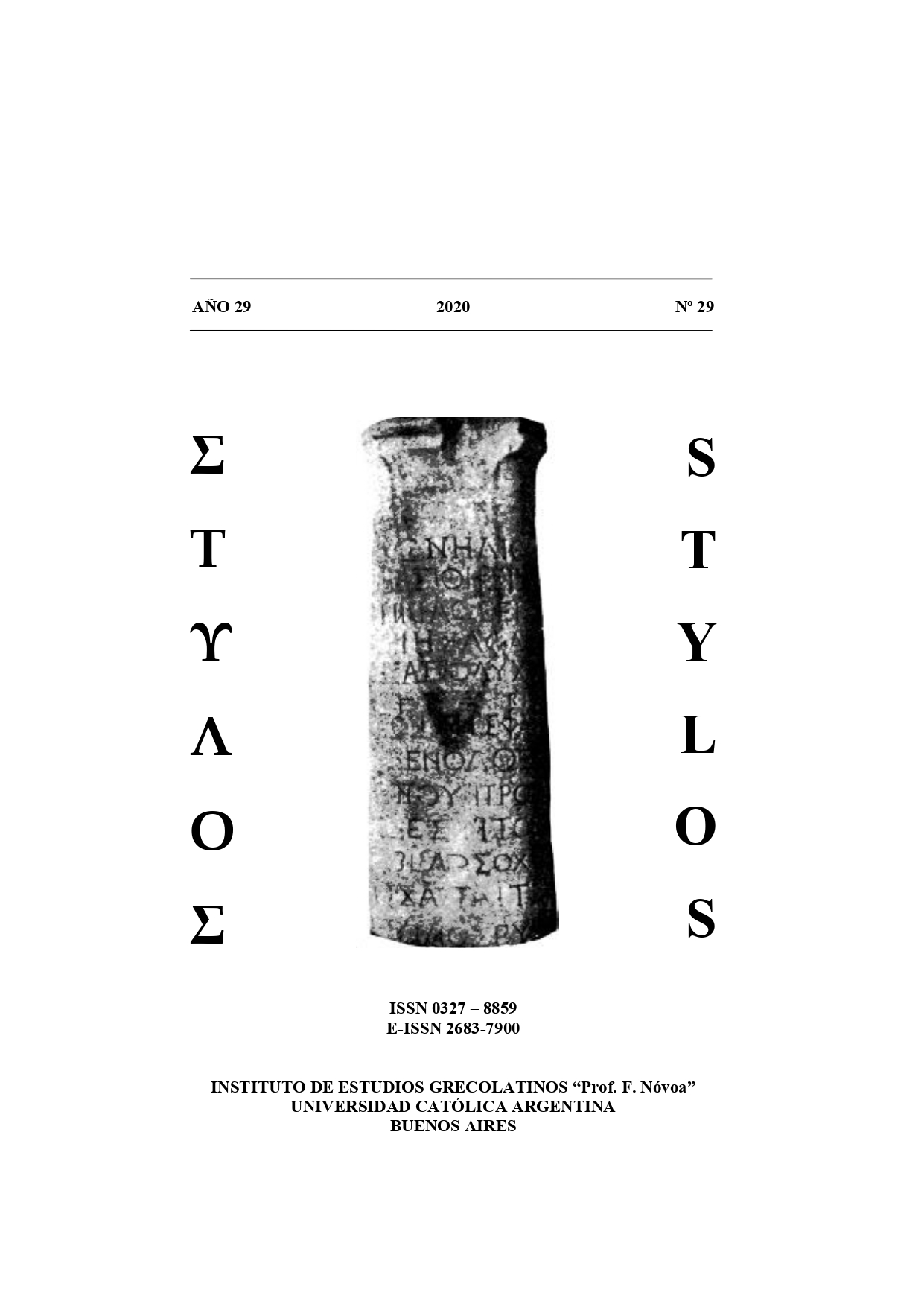HANNAH ARENDT SOBRE LA PHILÍA Y LA IGUALDAD. UNA DISCUSIÓN CON JACQUES RANCIÈRE
Keywords:
Arendt, Rancière, philia, equality, freedomAbstract
Our work seeks to clarify the categories of equality and freedom as key topics of the political phenomenon in Hannah Arendt and Jacques Rancière. Both of them identify the event of the political in experiences prior to the great tradition of political philosophy, however they highlight different aspects. Arendt receives the Greek philia as a bond instituted between equals who inhabit a defined domain: the public space. Rancière highlights the contentious aspect of an equality never fully achieved, in whose name every instituted power structure is permanently questioned. Politics does not occur spatially, but in the right to that spatiality. We will divide the body of the article into three sections. First, we argue that the category of the political in Hannah Arendt is inseparable from a reading of the political life of ancient Greece, which seeks to avoid the approach of political philosophy. In this context, he resorts to Aristotelian political friendship. Second, we expose Arendt's recovery of the Aristotelian philia politike as a device that renders the different equivalents. Our thesis is that this equality granted by philia is political. Third, we examine Jacques Rancière's assessment of the scandal and exceptionality that leads to the emergence of politics, and the way in which political philosophy seeks to regulate this aporia. In conclusion, we examine the limits of Rancière's main critique of Arendt.Downloads
References
ARENDT, H., Crises of the Republic. San Diego, New York, London: Harcourt Brace & Company, 1970.
ARENDT, H., Between Past and Future. Eight Exercises in Political Thought. New York: Penguin Books [1961], 1993a.
ARENDT, H., Was ist Politik? Aus dem Nachlass. Heraugegeben von Ursula Ludz.Vorwort von Kurt Sontheimer. München, Zurich: Pieper, 1993b.
ARENDT, H., Essays in Understanding 1930-1954. Formation, Exile and Totalitarianism. New York, London: Schocken Books, 1994.
ARENDT, H., ¿Qué es la política? (Traducido por Rosa Sala Carbó). Barcelona: Paidós [1995], 1997.
ARENDT, H., The Human Condition. Chicago and London: The Uni-versity of Chicago Press [1958], 1998.
ARENDT, H., Ensayos de comprensión 1930-1954. Formación, Exilio y Totalitarismo. J. Kohn (ed.) A. Serrano de Haro (trad.). Madrid: Caparrós [1994], 2005a.
ARENDT, H., The Promise of Politics. New York, Toronto: Schocken Books, 2005b.
ARENDT, H., On Revolution. New York: Penguin Books [1963], 2006a.
ARENDT, H., Hombres en tiempos de oscuridad. Barcelona: Gedisa [1968], 2006b.
ARENDT, H., Responsabilidad y juicio. J. Kohn (ed.) M. Candel (trad.) Barcelona: Paidós [2003], 2007.
ARENDT, H., “Martin Heidegger cumple 80 años” (1969). En: G. Anders, H. Arendt, H. Jonas, K. Löwith, L. Strauss, Sobre Heidegger. Cinco vo-ces judías. (trad. B. Ainbinder), Buenos Aires: Manantial [1969], 2008.
ARENDT, H., The Last Interview and Other Conversations. Brooklyn, London: Melville House, 2013.
ARISTÓTELES, Constitución de los atenienses (traducción de Manuela García Valdés). Madrid: Gredos, 1984.
ARISTÓTELES, Ética a Nicómaco (traducción de María Araujo y Julián Marías). Madrid: CEPC, 1999.
ARISTÓTELES, Política (traducción de Carlos García Gual). Madrid: Tecnos, 2004.
ARISTÓTELES, Ética a Nicómaco (traducción de José Luis Calvo Mar-tínez). Madrid: Alianza, 2005.
BENHABIB, S., "The Embattled Public Sphere: Hannah Arendt, Juergen Habermas and Beyond”, Theoria: A Journal of Social and Political Theory 1997, 90: 1-24.
GOYENECHEA, E., "Arendt sobre Platón: la profesionalización de la política", Deus Mortalis. Cuaderno de Filosofía Política 2018, 12: 345-371.
HABERMAS, J., “Hannah Arendt’s Communications Concept of Power”, Social Research 1977, 44.1: 3-24.
HABERMAS, J., The Structural Transformation of the Public Sphere: An Inquiry into a Category of Bourgoise Society. Cambridge, Massachusetts: The MIT Press [1962], 1991.
ISÓCRATES, Discursos, volumen 1. Madrid: Gredos, 1978.
PASSERIN D’ENTRÈVES, M., The Political Philosophy of Hannah Arendt. London New York: Routledge, 1994.
PERICA, I.,“The Archipolitics of Jacques Rancière”, Krisis. Journal of Contemporary Philosophy, 2019, 1: 15-26.
PLATÓN, Político (traducción, intr.. y notas de Antonio Gonzáles Lazo). Madrid: Centro de Estudios Constitucionales, 1981.
PLATÓN, República (traducción de Antonio Camarero). Buenos Aires: Eudeba, 2004.
RANCIÈRE, J., DRURY, J., OSTER, C., Y PARKER, A., "The Order of the City”,Critical Inquiry 2004, 30. 2: 267-91.
RANCIÈRE, J., Dis-agreement. Politics and Philosophy. Translated by Julie Rose. Minneapolis, London: University of Minnesota Press [1995], 1999.
RANCIÈRE, J., Hartred of Democracy (translated by John Corco-ran).London, New York: Verso, 2006.
RANCIÈRE, J., Dissensus. On Politics and Aesthetics (ed. and translated by John Corcoran). London, New York: Continuum International Publishing Group, 2010.
RICOEUR, P., Lectures 1.Autour du Politique. Paris: Éditions du Seuil, 1991.
RICOEUR, P., Sí mismo como otro. Buenos Aires: Siglo XXI [1990], 2006.
SCHAAP, A., “Hannah Arendt and the Philosophical Repression of Politics”, 145-165. En: J.-P. Deranty, A. Ross, (eds), Jacques Ranciére and the Contemporary Scene. The Philosophy of Radical Equality. London: Continuum, 2012.
SÓFOCLES, Tragedias (traducción de A. Alamillo). Madrid: Gredos, 1981.
STRAUSS, L.,“What is Political Philosophy?”, en The Journal of Politics 1957, 19.3: 343-368.
STRAUSS, L. Y CROPSEY, J. (eds.), History of Political Philosophy. Chicago and London: The University of Chicago Press, 1987.
VILLA, D., “The Philosopher versus the Citizen: Arendt, Strauss, and Socrates”, Political Theory, 1998, 26, 2: 147-172.
Downloads
Published
How to Cite
Issue
Section
License






